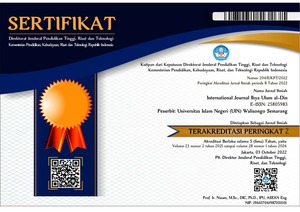Living Hadis as A Lifestyle (A portrait of the Dialectics of Hadis and Culture in Indonesia)
DOI:
https://doi.org/10.21580/ihya.22.2.5679Keywords:
Living Hadis, Islam in Indonesia, Hadis and CultureAbstract
The intersection between religion and culture is one of the characteristics of Islam in Nusantara, especially in Indonesia, including a people understanding of the Hadis. In the fact, until now, the traditions of Indonesia is contain of qur’anic and hadis spirit. The result of this paper, the author considers that living sunnah is not only a learning or researching, but it has become a model of understanding of Indonesian people towards it or it’s become a lifestyle of moslem in Indonesia that is always make ‘hadis is live’ or ‘live on the sunnah.’The forms of living hadis can not be separated from the connection of hadis with the culture. This can be seen from the tradition in Indonesia such as praying for people who have died, mauludan, haul, halal bi halal, and berkatan. Some of these tradition are the character of Islam in Indonesia. As stated by dialectical theory, the hadis and the culture are two opposites thing. However, both of them can be reconciled. For example, the tradition of berkatan/ tumpengan, this tradition is an implementation of the advise of giving in Islam. So, the consequnce of the implementation of this understanding are different because it has connected with culture in Indonesia
Downloads
References
Aizid, R. 2016. Sejarah Islam Nusantara; Dari Analisis Historis hingga Arkeologis tentang Penyebaran Islam di Nusantara (First Edit). Diva Press.
al-Muqri’. 1996. Ahadith fi Dhamm al-Kalam wa Ahlih (first edit). Dar al-Atlas.
Anies, M. 2009. Tahlil dan Kenduri; Tradisi Santri dan Kiai (First Edit). Pustaka Pesantren.
Aziz, A. 2019. Khazanah Hadis di Indonesia. Guepedia.
Aziz, D. K. 2015. Akulturasi islam dan budaya jawa. Fikrah, I(2), 253–286.
Badri Khaeruman. 2010. Ulum al-Hadis (First Edit). Pustaka Setia.
Fitriah, A. 2013. Pemikiran Abdurrahman Wahid Tentang Pribumisasi Islam. Teosofi; Jurnal Tasawuf Dan Pemikiran Islam, 3(1).
Hakam, S. 2015. Halal Bi Halal, a Festival of Idul Fitri and It’S Relation With the History of Islamization in Java. Epistemé: Jurnal Pengembangan Ilmu Keislaman, 10(2). https://doi.org/10.21274/epis.2015.10.2.385-404
Hanif, A. 2016. Tradisi Peringatan Haul Dalam Pendekatan Sosiologi Pengetahuan Peter L. Berger. Dialogia, 13(1), 49–58.
Husna, M. 2019. Halal Bihalal Dalam Perspektif Adat Dan Syariat. Perada, 2(1), 45–56. https://doi.org/10.35961/perada.v2i1.29
HS, Muhammad Alwi, and Nur Hamid. 2019. “Relasi Kelisanan Al-Qur’an Dan Pancasila Dalam Upaya Menjaga Dan Mengembangkan Identitas Islam Indonesia.” International Journal Ihya’ ’Ulum Al-Din 21(1): 17–38. http://journal.walisongo.ac.id/index.php/ihya/article/view/4833.
Idris, A. F. 2017. Memahami Kembali Pemaknaan Hadis Qudsi. International Journal Ihya’ ’Ulum Al-Din, 18(2), 133. https://doi.org/10.21580/ihya.17.2.1734
Jati, W. R. 2013. Tradisi, Sunnah dan Bid’ah: Analisa Barzanji dalam Perspektif Cultural Studies. El-HARAKAH (TERAKREDITASI), 14(2), 226–242. https://doi.org/10.18860/el.v14i2.2315
Librianti, E. O. I. 2019. Dialektika Islam dan Budaya: Dakwah Kultural Nahdlatul Ulama. Ajiqs, 1(1).
Mustamar, M. (n.d.). al-Muqtatafat li Ahl al-Bidayat. PP. Sabilur Rasyad.
Nadia, Z. 2016. Tradisi Maulid Pada Masyarakat Mlangi Yogyakarta. ESENSIA: Jurnal Ilmu-Ilmu Ushuluddin, 12(2), 367. https://doi.org/10.14421/esensia.v12i2.718
Qomar, M. 2016. Islam Nusantara: Sebuah Alternatif Model Pemikiran, Pemahaman, Dan Pengamalan Islam. El-HARAKAH (TERAKREDITASI), 17(2), 198. https://doi.org/10.18860/el.v17i2.3345
Rodin, R. 2013. Tradisi Tahlilan Dan Yasinan. IBDA` : Jurnal Kajian Islam Dan Budaya, 11(1), 76–87. https://doi.org/10.24090/ibda.v11i1.69
Suparjo, S. 1970. Islam dan Budaya: Strategi Kultural Walisongo dalam Membangun Masyarakat Muslim Indonesia. KOMUNIKA: Jurnal Dakwah Dan Komunikasi, 2(2), 178–193. https://doi.org/10.24090/komunika.v2i2.100
Suryadi. 2007. Dari Living Sunnah ke Living Hadis. In S. Syamsuddin (Ed.), Metodologi Peneltian Living Qur’an dan Hadis (First Edit). Teras.
Suryadilaga, M. A. 2007. Model-Model Living Hadis. In Metodologi Peneltian Living Qur’an dan Hadis (First Edit). Teras.
UINSA, L. T. M. al-J. 2020. Adab al-Talibin Fi Ta`lim Sayyid al-Mursalin (cetakan ke). Ma’had al-Jami`ah UINSA.
Wahid, A. (2012). Tuhan Tidak Perlu Dibela (Second Edi). LKiS.
Warsino, A. 2017. Tradisi Tahlilan Upaya Menyambung Silaturahmi. Ri’ayah, 02(02), 69–79.
Wasid. 2010. Gus Dur Sang Guru Bangsa; Pergolakan Islam, Kemanusiaan, dan Kebangsaan (First Edit). interpena.
Wijaya, A. 2011. Menusantarakan Islam; Menelusuri Jejak Pergumulan Islam yang Tak Kunjung Usai di Nusantara. Nadi Pustaka.
Zuhri, S. and S. K. D. 2018. Living Hadis; Praktik, Resepsi, Teks, dan Transmisi (first edit). Q-Media.
Zulfikar, E. 2018. Tradisi Halal Bihalal dalam Perspektif Al-Qurâ€TMan dan Hadis. Jurnal Online Studi Al-Qur’an, 14(2), 127–150. https://doi.org/10.21009/jsq.014.2.03
Downloads
Published
How to Cite
Issue
Section
License
By submitting an article to the journal, the author(s) agree to transfer the published article's copyright to the journal, which will act as the publisher. This means the journal will have the right to publish the article in various forms, including reprints. The journal will maintain the publishing rights to the published articles.
This work is licensed under Creative Commons Attribution-ShareAlike 4.0 International License.
In line with the license, authors and third parties (readers, researchers, and others) are allowed to share and adapt the material. In addition, the material must be given appropriate credit, provided with a link to the license, and indicated if changes were made. If authors remix, transform or build upon the material, authors must distribute their contributions under the same license as the original.



